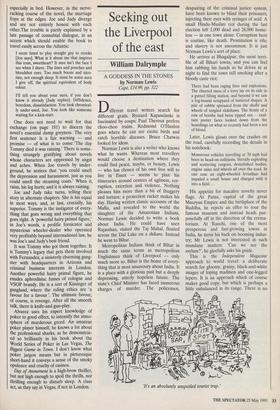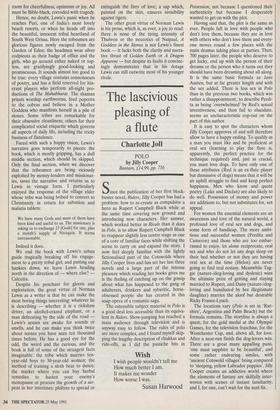Seeking out the Liverpool of the east
William Dalrymple
A GODDESS IN THE STONES by Norman Lewis Cape, £14.99, pp. 322 Different travel writers search for different grails. Ryszard Kapuscinski is fascinated by coups; Paul Theroux prefers choo-choo trains. Redmond O'Hanlon goes where he can see exotic birds and catch horrible diseases. Bruce Chatwin looked for ideas.
Norman Lewis is also a writer who knows what he wants. Whereas most travellers would choose a destination where they could find peace, maybe, or beauty, Lewis — who has chosen of his own free will to live in Essex — seems to plan his itineraries around centres of ugliness, cor- ruption, extortion and violence. Nothing pleases him more than a bit of thuggery and torture; a protection racket makes his day. Having written classic accounts of the Mafia, and revealed to the world the slaughter of the Amazonian Indians, Norman Lewis decided to write a book about India. He could have seen Rajasthan, visited the Taj Mahal, floated across the Dal Lake on a shikara. Instead he went to Bihar.
Metropolitan Indians think of Bihar in much the same terms as metropolitan Englishmen think of Liverpool — only much more so. Bihar is the home of every- thing that is most unsavoury about India. It is a place with a glorious past but a deeply depressing, utterly hopeless future. The state's Chief Minister has faced numerous charges of murder. The policemen, despairing of the criminal justice system, have been known to blind their prisoners, injecting their eyes with syringes of acid. A small Hindu-Muslim riot during the last election left 2,000 dead and 28,000 home- less — in one town alone. Corruption here is routine, like death. Prostitution is rife; and slavery is not uncommon. It is just Norman Lewis's sort of place.
He arrives at Bhagalpur, the most terri- ble of all Bihari towns, and you can feel him rubbing his hands as he drives in at night to find the town still smoking after a bloody caste riot:
There had been raging fires and explosions. The charred mess of a lorry lay on its side in a gutted filling station, and beyond it we saw a fog-bound scrapyard of battered shapes. A pile of rubble sprouted from the shafts and wheels of tangled rickshaws. The fronts of a row of booths had been ripped out... exul- tant poster faces looked down from the hoardings on what so recently had been a sea of blood.
Later, Lewis gloats over the crashes on the road, carefully recording the details in his notebook:
Monstrous vehicles travelling at 70 mph had been in head-on collisions, literally exploding and scattering cargoes, demolished bodies, engine axles and wheels all over the road. In one case an eight-wheeled leviathan had impaled a small house and charged with it into a field...
His appetite for macabre novelty never flags. At Patna, capital of the great Mauryan Empire and the birthplace of the Buddha, he rejects an offer to tour the famous museum and instead heads pur- posefully off in the direction of the crema- torium. At Ranchi, one of the most prosperous and fast-growing towns in India, he turns his back on booming indus- try; Mr Lewis is not interested in such mundane matters: 'Can we see the asylum?', he gleefully asks his guide.
This is the Independent Magazine approach to world travel: a deliberate search for gloomy, grainy, black-and-white images of loping madmen and one-legged lepers. It is an approach which of course makes good copy, but which is perhaps a little unbalanced in its range. There is no `It's an absolutely unspoiled tourist trap.' room for cheerfulness, optimism or joy. All must be Bible-black, corroded with tragedy.
Hence, no doubt, Lewis's panic when he reaches Puri, one of India's most lovely beach resorts, or when he heads off into the beautiful, innocent tribal heartland of South West Orissa. Here the tribesmen are glorious figures newly escaped from the Garden of Eden: the headmen wear silver codpieces as their badge of office and the girls, who go around either naked or top- less, are gratifyingly good-looking and promiscuous. It sounds almost too good to be true: every village contains connoisseurs of poetry, and has a field reserved for itin- erant players who perform all-night pro- ductions of The Mahabharat. The shaman priests worship earthworms, feed popcorn to the cobras and believe in a Mother Goddess who manifests herself in a pile of stones. Some tribes are remarkable for their obsessive cleanliness; others for their complicated social etiquette which governs all aspects of daily life, including the tricky business of flatulence.
Faced with such a happy vision, Lewis's narrative goes temporarily to pieces: the book, which is mostly gripping, has a dull middle section, which should be skipped. Only the final section, when we discover that the tribesmen are being viciously exploited by money-lenders and missionar- ies, saves the narrative and returns us to Lewis in vintage form. I particularly enjoyed the response of the village elder whose tribe was being bribed to convert to Christianity in return for salvation and malaria tablets:
We have many Gods and most of them have been kind and useful to us. The missionary is asking us to exchange 23 [Gods] for one, plus a month's supply of Nivaquin. It seems unreasonable.
Indeed it does.
We end the book with Lewis's urban guide tragically breaking off his engage- ment to a pretty tribal girl; and putting our hankies down, we leave Lewis heading north in the direction of — where else? Calcutta.
Despite his penchant for gloom and exploitation, the great virtue of Norman Lewis as a writer is that he can make the most boring things interesting: whatever he is describing — whether it is a rickshaw driver, an alcohol-crazed elephant, or a man defecating by the side of the road Lewis's senses are awake for sounds or smells, and he can make you think twice about scenes you have seen ten thousand times before. He has a good eye for the odd, the weird and the curious, and the book is full of some of the strangest facts imaginable: the tribe which marries ten- year-old boys to 30-year-old women; the method of training a sloth bear to dance; the market where you can buy herbal remedies to hasten your enemy's menopause or procure the growth of a ser- pent in her intestines; philtres to spread or extinguish the fires of love; a sap which, painted on the skin, ensures invisibility against tigers.
The other great virtue of Norman Lewis is his prose, which is, as ever, a joy to read: there is none of the tiring intensity of Thubron or the neurotics of Naipaul. A Goddess in the Stones is not Lewis's finest book — it lacks both the clarity and narra- tive thrust of Golden Earth or A Dragon Apparent — but despite its faults it convinc- ingly demonstrates that in his dotage Lewis can still outwrite most of his younger rivals.



















































 Previous page
Previous page